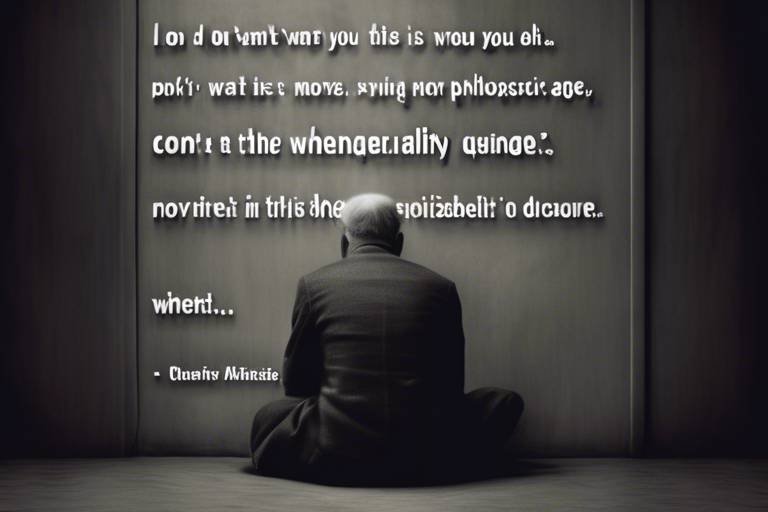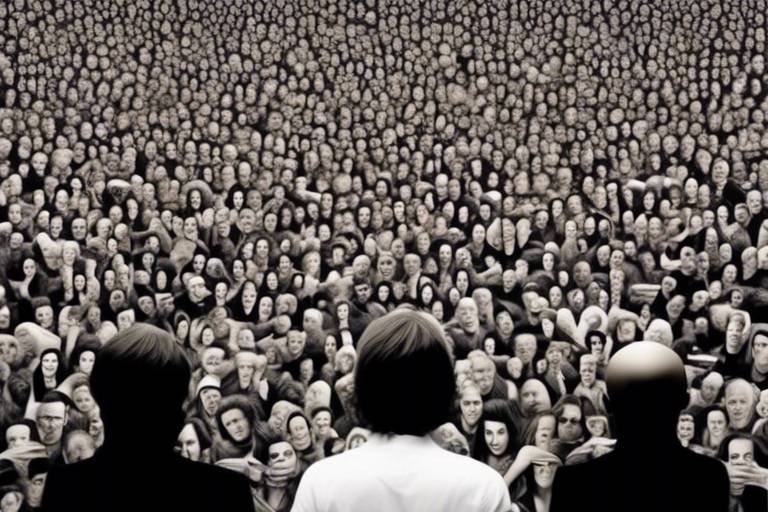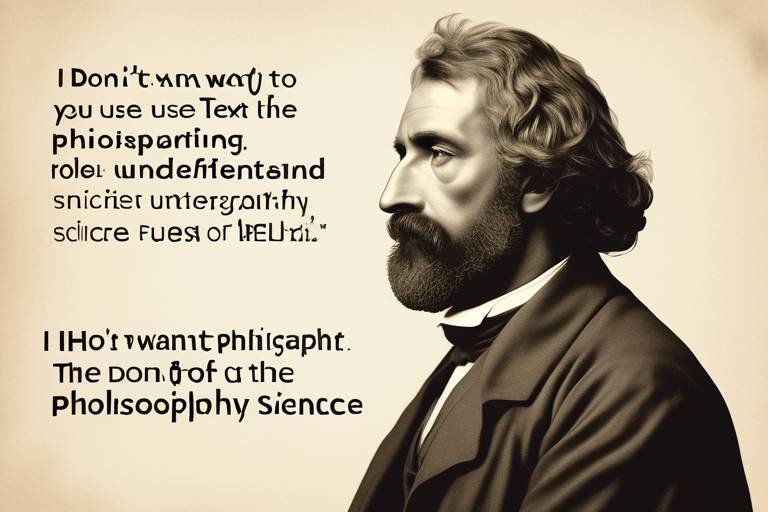Vulnerability in the Philosophical Discourse
Vulnerability is a concept that often evokes a myriad of emotions and thoughts. At its core, vulnerability encapsulates the idea of being open to emotional exposure, risk, and uncertainty. In philosophical discourse, this concept takes on a deeper significance, serving as a lens through which we can examine the human condition. It challenges us to confront our weaknesses and fears while simultaneously encouraging a more profound understanding of our shared humanity. But why should we care about vulnerability? What does it mean for our everyday lives and our interactions with others? These questions are not just academic; they resonate with the fabric of our existence.
Philosophers across various traditions have explored vulnerability in different ways. For instance, existentialists view vulnerability as an inherent part of the human experience, emphasizing that acknowledging our limitations can lead to authentic existence. On the other hand, feminist philosophy often highlights how societal structures exacerbate vulnerabilities, particularly for marginalized groups. This interplay of perspectives enriches our understanding of vulnerability, making it a crucial topic in contemporary thought.
Moreover, vulnerability is not merely a personal trait but a collective experience. In a world where social media often portrays an idealized version of life, the rawness of vulnerability can feel both refreshing and terrifying. It invites us to peel back the layers of our curated personas and embrace the messy, imperfect reality of being human. This act of embracing vulnerability can foster empathy, compassion, and deeper connections in our relationships. It encourages us to ask ourselves: how can we create spaces where vulnerability is not only accepted but celebrated?
As we navigate the complexities of vulnerability, it's essential to recognize its implications in various spheres of life. From ethical considerations in social justice to the dynamics of interpersonal relationships, vulnerability plays a pivotal role. By engaging with this concept, we can foster a more equitable society that values each individual's experiences and challenges. Ultimately, vulnerability is not just a philosophical idea; it's a fundamental aspect of our shared humanity that deserves exploration and understanding.
- What is vulnerability in philosophical terms? Vulnerability refers to the state of being exposed to the possibility of being harmed, either physically or emotionally. Philosophically, it encompasses the complexities of human existence and relationships.
- Why is vulnerability important in ethics? Vulnerability shapes our moral responsibilities towards others, highlighting the need for compassion and support, particularly for those who are marginalized or oppressed.
- How does vulnerability relate to social justice? Acknowledging vulnerability in social justice movements can lead to more equitable solutions by recognizing the unique challenges faced by different groups.
- Can vulnerability strengthen relationships? Yes! Embracing vulnerability in communication can foster trust and deeper connections between individuals.

The Nature of Vulnerability
This article explores the concept of vulnerability within philosophical discussions, examining its implications, significance, and relevance in contemporary thought and ethics.
Understanding vulnerability is a complex and multifaceted endeavor that invites us to delve deep into its definitions and interpretations across various philosophical traditions. At its core, vulnerability can be seen as the inherent state of being open to emotional, physical, or psychological harm. However, this definition barely scratches the surface. Philosophers have long debated what it means to be vulnerable, often highlighting its dual nature as both a source of weakness and a powerful avenue for connection and growth.
In existential philosophy, vulnerability is often linked to the human condition. Think about it: we are all navigating a world full of uncertainties, and this uncertainty is what makes us vulnerable. The existentialists argue that acknowledging our vulnerability is essential to understanding our existence. It’s like standing on the edge of a cliff, feeling the wind rush past you. It can be terrifying, but it also offers a breathtaking view of life’s possibilities.
Moreover, various philosophical traditions provide unique lenses through which we can examine vulnerability. For instance, in Eastern philosophies, vulnerability is often seen as a pathway to enlightenment. By embracing our vulnerabilities, we can cultivate a deeper understanding of ourselves and our connection to the universe. This perspective encourages us to view vulnerability not as something to be feared, but as a fundamental aspect of our humanity.
In contemporary discourse, the significance of vulnerability has gained traction, especially in discussions surrounding mental health and emotional well-being. The modern understanding of vulnerability emphasizes the importance of openness and authenticity. When we allow ourselves to be vulnerable, we create space for genuine connections with others. This notion aligns with the idea that vulnerability can foster empathy and compassion, ultimately enriching our relationships and communities.
To further illustrate the nature of vulnerability, let's consider a few key aspects:
- Emotional Vulnerability: The willingness to expose our feelings and emotions, which can lead to deeper connections.
- Physical Vulnerability: The acceptance of our physical limitations and the potential for harm, reminding us of our humanity.
- Social Vulnerability: The recognition of our dependence on others, highlighting the importance of community and support.
In summary, the nature of vulnerability is not merely about weakness; it's about the profound strength that arises from embracing our imperfections and uncertainties. By understanding vulnerability in its various forms, we can better appreciate its role in the intricate tapestry of human experience.
- What is vulnerability in a philosophical context? Vulnerability in philosophy refers to the state of being open to emotional, physical, or psychological harm, often explored through various philosophical traditions.
- How does vulnerability relate to human relationships? Vulnerability fosters deeper connections and understanding in relationships by promoting openness and authenticity.
- Can vulnerability be seen as a strength? Yes, embracing vulnerability can lead to personal growth, empathy, and stronger community ties.

Vulnerability and Ethics
When we dive into the deep waters of vulnerability and ethics, we’re not just skimming the surface; we’re exploring the very foundations of human interaction and moral responsibility. Vulnerability is often perceived as a weakness, but in ethical discussions, it emerges as a powerful lens through which we can view our obligations to one another. It challenges us to rethink our understanding of strength and opens the door to a more compassionate society. So, what does it really mean to be vulnerable in an ethical context? Let's break it down.
At its core, vulnerability invites us to recognize our interdependence. We live in a world where our actions impact others, often in ways we cannot immediately see. This interconnectedness compels us to consider how our choices affect not just ourselves but also those around us. For instance, when we think about social policies, acknowledging the vulnerability of various groups can lead to more equitable solutions. If we ignore the needs of the most vulnerable, we risk perpetuating cycles of inequality and injustice.
Moreover, vulnerability shapes our moral responsibilities. It calls us to act with awareness and empathy. When we encounter someone who is struggling, whether due to economic hardship, health issues, or social isolation, our ethical duty is to respond with compassion. This responsibility extends beyond individual acts of kindness; it also implicates us in broader societal structures. Ethical frameworks that prioritize vulnerability encourage us to advocate for systemic changes that uplift marginalized communities.
To illustrate this point, consider the following examples:
- Healthcare Access: Recognizing the vulnerability of individuals without adequate healthcare prompts ethical discussions about universal access and the right to health.
- Environmental Justice: Vulnerability in the face of climate change highlights our moral obligation to protect those disproportionately affected by environmental degradation.
In essence, vulnerability enriches our ethical discourse by adding layers of complexity. It challenges us to ask difficult questions: How do we balance our own needs with the needs of others? What does it mean to be responsible in a world where vulnerability is a shared human experience? These questions lead us to a more profound understanding of ethics as not merely a set of rules but as a dynamic conversation about our shared humanity.
Furthermore, the recognition of vulnerability can foster a culture of trust and openness within communities. When individuals feel safe to express their vulnerabilities, it creates a space for authentic dialogue and connection. This is particularly important in environments where power dynamics can create barriers to understanding. By acknowledging our vulnerabilities, we can break down these barriers and work towards a more inclusive and empathetic society.
In conclusion, vulnerability is not just a personal experience; it is a crucial component of ethical discussions that shape our world. It encourages us to act with empathy, to recognize our interconnectedness, and to foster a culture of support and understanding. By embracing vulnerability, we not only enhance our ethical frameworks but also contribute to building a more just and compassionate society.
- What is the relationship between vulnerability and ethics?
Vulnerability highlights our moral responsibilities towards others, urging us to act with empathy and awareness of our interconnectedness. - How can acknowledging vulnerability lead to social change?
By recognizing the needs of vulnerable populations, we can advocate for policies and practices that promote equity and justice. - Why is vulnerability important in interpersonal relationships?
Openness about vulnerability fosters trust and deeper connections, enhancing communication and understanding between individuals.

Vulnerability in Social Justice
The concept of vulnerability plays a crucial role in the realm of social justice, acting as a lens through which we can better understand the dynamics of power, inequality, and human dignity. When we talk about vulnerability, we are not merely referring to the weaknesses or disadvantages that individuals or groups face; rather, we are highlighting the inherent fragility of human existence. Each person, regardless of their status, can experience vulnerability in different contexts, and recognizing this is essential for fostering a more just society.
In social justice movements, acknowledging vulnerability can be a transformative act. It encourages us to see beyond our own experiences and to empathize with those who are marginalized or oppressed. By embracing the idea that everyone has the potential to be vulnerable, we can cultivate a culture of compassion and understanding. This shift in perspective can lead to more inclusive policies and practices that aim to uplift those who have been historically silenced or ignored.
Moreover, vulnerability is intricately linked to the concept of intersectionality. This framework helps us understand how various social identities—such as race, gender, sexuality, and class—intersect to create unique experiences of vulnerability. For instance, a Black woman may face different challenges than a white woman, not just because of her gender, but also due to the racial dynamics that shape her reality. Recognizing these intersections allows social justice advocates to address the specific needs of diverse populations, rather than applying a one-size-fits-all approach.
Furthermore, the acknowledgment of vulnerability can lead to the development of more equitable systems. When we understand that certain groups are more vulnerable due to systemic injustices, we can advocate for policies that aim to rectify these disparities. For example, social justice initiatives may include:
- Access to healthcare for marginalized communities
- Education programs that address systemic inequalities
- Legal protections for those facing discrimination
By prioritizing the voices of the vulnerable, we not only empower those individuals but also enrich our collective understanding of justice. This approach fosters a society where everyone, regardless of their background, can contribute to and benefit from social progress.
In summary, vulnerability is not a sign of weakness; it is a powerful catalyst for change within social justice movements. By embracing vulnerability, we can create a more equitable society that recognizes the complexities of human experience and works towards a future where every individual is valued and supported.
- What is vulnerability in the context of social justice?
Vulnerability in social justice refers to the recognition of the inherent fragility and challenges faced by marginalized groups, which informs efforts to create equitable systems and policies. - How does intersectionality relate to vulnerability?
Intersectionality examines how different social identities intersect, creating unique experiences of vulnerability that must be understood to effectively address social injustices. - Why is acknowledging vulnerability important for social justice?
Acknowledging vulnerability fosters empathy, encourages inclusivity, and helps to identify the specific needs of diverse populations, leading to more effective social justice initiatives.

Intersectionality and Vulnerability
When we talk about intersectionality, we're diving into a rich tapestry of identities and experiences that shape how we navigate the world. Imagine a colorful quilt, each patch representing different aspects of our identity—race, gender, sexuality, ability, and class. Each thread interwoven creates a unique pattern that is both beautiful and complex. This concept, coined by legal scholar Kimberlé Crenshaw, helps us understand how overlapping social identities can lead to distinct experiences of vulnerability. For instance, a Black woman may face challenges that are different from those encountered by a white woman or a Black man, highlighting the necessity of viewing vulnerability through a multifaceted lens.
In many ways, recognizing intersectionality is like putting on a pair of glasses that allow us to see the world in high definition. It reveals how power dynamics and social structures can amplify or mitigate vulnerability. When we acknowledge that individuals do not exist in isolation but are part of a web of interconnected identities, we can better understand the unique struggles faced by those at the intersections of multiple marginalized identities. This understanding is crucial in addressing systemic inequalities and fostering a more inclusive society.
Moreover, intersectionality sheds light on the importance of contextualizing vulnerability. For example, consider the following scenarios:
- A queer person of color may experience discrimination not only based on their race but also due to their sexual orientation.
- A disabled individual from a low-income background may encounter barriers that are different from those faced by a wealthy, able-bodied person.
- A refugee fleeing violence may grapple with vulnerabilities that stem from both their nationality and their status as a newcomer in a foreign land.
These examples illustrate that vulnerability is not a one-size-fits-all experience. It is deeply influenced by the intersections of our identities. Recognizing these nuances is essential for creating policies and support systems that genuinely address the needs of diverse populations. By doing so, we can work towards a society that not only acknowledges vulnerability but actively seeks to reduce it through compassion and understanding.
In the realm of social justice, intersectionality plays a pivotal role in shaping movements that advocate for the rights of those who are most vulnerable. Activists and organizations that embrace an intersectional approach are better equipped to address the root causes of inequality and to create solutions that uplift all members of society. This is not just about amplifying the voices of the marginalized; it's about creating a collective strength that can challenge systemic oppression.
Ultimately, understanding the interplay between intersectionality and vulnerability allows us to foster a culture of empathy and solidarity. It encourages us to listen to the stories of others, to recognize the unique challenges they face, and to stand together in the fight for justice. In a world where vulnerability can often feel isolating, intersectionality reminds us that we are all connected in our human experience.
- What is intersectionality? Intersectionality is a framework that examines how various social identities—such as race, gender, and class—intersect to create unique experiences of discrimination and privilege.
- Why is understanding vulnerability important? Understanding vulnerability is essential because it helps us recognize the diverse challenges faced by individuals and communities, allowing us to create more inclusive and supportive environments.
- How can intersectionality inform social justice movements? By acknowledging intersectionality, social justice movements can address the specific needs of marginalized groups, leading to more effective advocacy and policy change.

Vulnerability in Human Rights
The concept of vulnerability plays a pivotal role in the discourse surrounding human rights, acting as a lens through which we can examine the needs and protections required by individuals and groups facing various forms of marginalization. Vulnerability, in this context, is not merely a state of being weak or defenseless; rather, it encapsulates the complex interplay of social, economic, and political factors that contribute to an individual's or community's need for rights and protections. Recognizing vulnerability allows us to better understand the specific challenges faced by marginalized populations, such as refugees, the homeless, and victims of systemic discrimination.
Human rights frameworks are fundamentally rooted in the idea of dignity and respect for all individuals. However, this respect must be informed by an awareness of the vulnerabilities that exist within different social contexts. For instance, consider the plight of indigenous peoples who often navigate a landscape fraught with historical injustices and ongoing inequalities. Their unique vulnerabilities necessitate tailored human rights protections that address not only their cultural identity but also the socio-economic conditions that threaten their existence.
Moreover, vulnerability in human rights discourse emphasizes the importance of intersectionality. The experiences of vulnerability are not monolithic; they vary significantly based on intersecting identities such as race, gender, sexual orientation, and socio-economic status. This intersectional approach is crucial in ensuring that human rights protections are inclusive and effectively address the diverse needs of all individuals. For example, a woman of color may face compounded vulnerabilities that require specific attention in human rights advocacy, highlighting the need for policies that are both sensitive and responsive to these complexities.
| Vulnerable Groups | Specific Needs | Recommended Protections |
|---|---|---|
| Refugees | Safe shelter, legal assistance | International protection, resettlement programs |
| Indigenous Peoples | Cultural preservation, land rights | Recognition of land rights, support for cultural initiatives |
| Women and Girls | Protection from violence, access to education | Legal reforms, educational programs |
In summary, understanding vulnerability in the realm of human rights is essential for creating a more just and equitable society. By acknowledging the unique challenges faced by different groups, we can advocate for policies and protections that not only recognize their rights but also empower them to overcome the barriers that inhibit their full participation in society. The call to action is clear: we must strive to build a world where vulnerability is met with compassion and action, ensuring that every individual can enjoy their fundamental human rights without fear or discrimination.
- What is the connection between vulnerability and human rights?
Vulnerability highlights the specific needs and challenges faced by marginalized groups, informing the development of human rights protections tailored to their circumstances. - How does intersectionality relate to vulnerability?
Intersectionality recognizes that individuals may experience multiple, overlapping forms of vulnerability based on their various identities, necessitating a nuanced approach to human rights advocacy. - Why is it important to address vulnerability in human rights discussions?
Addressing vulnerability ensures that human rights protections are comprehensive, inclusive, and effective in meeting the needs of all individuals, particularly those who are most at risk.

Philosophical Perspectives on Vulnerability
When we dive into the philosophical waters of vulnerability, we find ourselves navigating through a rich tapestry of thoughts and ideas. Philosophers have long grappled with the concept of vulnerability, each bringing their unique lens to its interpretation. From the existentialists who view vulnerability as an essential part of the human condition to feminists who highlight its role in social dynamics, the perspectives are as diverse as they are enlightening.
Existentialism, for instance, posits that vulnerability is intrinsic to our existence. Think about it: to be human is to be vulnerable. We are constantly faced with choices that define our essence, and with each choice comes the risk of failure or disappointment. This perspective encourages us to embrace our vulnerabilities as part of our authentic selves, rather than shying away from them. It’s like standing on the edge of a cliff, feeling the wind rush past you; it’s terrifying yet exhilarating, and it’s in that moment of vulnerability that we truly understand what it means to live.
On the other hand, feminist philosophy sheds light on how vulnerability is often shaped by societal structures. It argues that certain groups are more vulnerable than others due to systemic inequalities. For instance, women, people of color, and LGBTQ+ individuals often face unique vulnerabilities that are rooted in societal norms and expectations. By acknowledging these disparities, feminist theorists advocate for a more equitable society where vulnerabilities are not just recognized but addressed. This approach is akin to a gardener tending to a diverse garden; each plant has its own needs, and understanding these needs is crucial for a thriving ecosystem.
Postmodernism adds another layer to this discussion by questioning the very foundations of vulnerability. It challenges the idea of a singular experience of vulnerability, suggesting instead that it is fluid and context-dependent. This perspective highlights how our understanding of vulnerability can shift based on cultural, social, and historical contexts. It’s like trying to catch water in your hands; no matter how hard you try, it slips through your fingers, reminding us that vulnerability is not a fixed state but a dynamic interplay of forces.
To summarize, the philosophical perspectives on vulnerability are multifaceted and deeply interconnected. Here’s a quick breakdown:
| Philosophical Perspective | Key Idea |
|---|---|
| Existentialism | Vulnerability is essential to the human experience. |
| Feminism | Vulnerability is shaped by societal inequalities. |
| Postmodernism | Vulnerability is fluid and context-dependent. |
Each of these perspectives invites us to reflect on our own vulnerabilities and how they shape our interactions with the world. They challenge us to think critically about how we perceive vulnerability—not just in ourselves but in others as well. By understanding these philosophical viewpoints, we can foster a deeper empathy and connection with those around us, paving the way for more inclusive and compassionate communities.
- What is vulnerability in philosophy?
Vulnerability in philosophy refers to the inherent risks and uncertainties of being human, often explored through various philosophical lenses such as existentialism, feminism, and postmodernism. - Why is vulnerability important in ethics?
Vulnerability is crucial in ethics as it shapes our moral responsibilities towards others, encouraging compassionate and equitable treatment of individuals and communities. - How can understanding vulnerability improve relationships?
Understanding vulnerability can enhance relationships by fostering openness and trust, leading to more authentic and meaningful connections.

The Role of Vulnerability in Relationships
When we think about relationships, whether they are romantic, familial, or friendships, the word vulnerability often pops up. But what does it really mean to be vulnerable with someone? It’s about more than just sharing your deepest secrets; it’s about opening yourself up to another person, allowing them to see the real you—the good, the bad, and the ugly. In a world where we often put up walls to protect ourselves, embracing vulnerability can feel like standing on the edge of a cliff, ready to leap. It’s scary, yet it’s also incredibly liberating.
Vulnerability is the glue that holds relationships together. When we allow ourselves to be vulnerable, we create a space for genuine connection. Imagine trying to build a house without a solid foundation; it just wouldn’t work. Similarly, relationships built on façades are often shaky and prone to collapse. When you show your true self to others, it invites them to do the same. This mutual exchange fosters trust and intimacy, making the bond stronger and more resilient.
Think about it: Have you ever had a conversation with someone where both of you shared your fears or dreams? That moment of honesty can feel like magic. It’s as if you’re both saying, “I trust you enough to show you my scars.” This kind of openness not only deepens your connection but also helps to normalize the struggles we all face. By sharing our vulnerabilities, we remind each other that we’re not alone in our experiences.
However, vulnerability isn't just about emotional sharing; it also plays a crucial role in communication. When we communicate openly about our feelings, desires, and concerns, we pave the way for healthier interactions. It’s like having a roadmap for navigating the complexities of relationships. Without this clarity, misunderstandings can easily arise, leading to conflict and resentment. Remember, relationships thrive on clear communication, and vulnerability is the key that unlocks that door.
But let’s not forget that vulnerability also requires courage. It’s not easy to put yourself out there, especially in a world that often rewards stoicism and emotional toughness. Yet, it’s this very act of being vulnerable that can lead to profound growth, both individually and collectively. By embracing our vulnerabilities, we not only enrich our own lives but also create a more compassionate environment for those around us. It’s a beautiful cycle: the more we share, the more we connect, and the more we connect, the safer we feel to share.
To sum it up, vulnerability is a powerful force in relationships. It enhances trust, fosters deeper connections, and encourages open communication. So, the next time you find yourself hesitating to share a part of yourself, remember that taking that leap can lead to a much richer and more fulfilling relationship. After all, isn’t that what we all crave? Connection and understanding? By being vulnerable, we take the first step toward building those bridges.
- Why is vulnerability important in relationships?
Vulnerability fosters trust and intimacy, allowing deeper connections to form. - How can I become more vulnerable with others?
Start by sharing small personal stories and gradually open up about deeper feelings. - What are the risks of being vulnerable?
There’s a chance of being hurt, but the rewards often outweigh the risks in building meaningful relationships.

Vulnerability in Communication
When we think about communication, we often envision it as a simple exchange of words. However, the truth is that effective communication is much more than just the verbal aspect; it involves a deep sense of vulnerability. Imagine standing on a stage, pouring your heart out to an audience. That feeling of exposing your innermost thoughts and emotions is what vulnerability in communication is all about. It requires a willingness to be open, to share not just our ideas but also our feelings, fears, and uncertainties. This openness can create a powerful connection between people, fostering understanding and empathy.
In many ways, vulnerability acts as the bridge that connects us to others. When we allow ourselves to be vulnerable, we invite others to do the same. This mutual sharing can lead to more authentic conversations, where both parties feel safe to express their true selves. Think about it—how often have you felt a stronger bond with someone after they shared a personal story or a struggle? That’s the magic of vulnerability in communication. It transforms mundane exchanges into meaningful dialogues that can change our perspectives and deepen our relationships.
However, embracing vulnerability in communication is not without its challenges. Many of us are conditioned to put up walls, to shield ourselves from potential judgment or rejection. This can lead to superficial interactions that lack depth and authenticity. To counter this, we need to cultivate an environment where vulnerability is not only accepted but encouraged. Here are some key elements that can help foster such an environment:
- Active Listening: Truly hearing what someone is saying can create a safe space for vulnerability.
- Empathy: Putting ourselves in someone else's shoes allows for a deeper understanding of their feelings.
- Non-judgment: Creating a judgment-free zone encourages others to share openly.
By integrating these elements into our communication practices, we can promote a culture of vulnerability that enriches our interactions. It’s important to remember that vulnerability is not a sign of weakness; rather, it is a demonstration of strength and courage. When we communicate with vulnerability, we are essentially saying, “I trust you enough to show you who I really am.” This trust can lead to more profound connections and can even inspire others to be vulnerable in return.
As we navigate through our conversations, it’s essential to recognize that vulnerability can also enhance our conflict resolution skills. When we approach disagreements with a vulnerable mindset, we are more likely to express our feelings honestly rather than defensively. This can lead to solutions that are more satisfactory for all parties involved. In essence, vulnerability in communication can transform potential conflicts into opportunities for growth and understanding.
In conclusion, vulnerability in communication is a powerful tool that can strengthen our relationships and foster a deeper understanding of one another. By embracing our vulnerabilities and encouraging others to do the same, we can create a more connected and empathetic world. So, the next time you find yourself in a conversation, consider how being open and vulnerable could enhance your connection with the other person. It might just lead to a more enriching dialogue than you ever imagined.
- What is vulnerability in communication?
Vulnerability in communication refers to the willingness to share one's true thoughts, feelings, and experiences openly, fostering deeper connections and understanding between individuals. - Why is vulnerability important in relationships?
Vulnerability is crucial in relationships because it builds trust and intimacy. When individuals share their vulnerabilities, it encourages mutual openness and strengthens the bond between them. - How can I practice vulnerability in my communication?
You can practice vulnerability by actively listening, being empathetic, and sharing your own feelings and experiences honestly. Create a safe space where both parties feel comfortable expressing themselves.

Vulnerability and Resilience
When we think about the concept of vulnerability, it often conjures images of weakness or fragility. However, this perception couldn't be further from the truth. In fact, embracing our vulnerabilities can be a powerful catalyst for building resilience. Just as a tree bends with the wind but doesn't break, our capacity to face challenges often hinges on our willingness to acknowledge and embrace our vulnerabilities. This connection between vulnerability and resilience is profound and worth exploring.
Consider this: when we allow ourselves to be vulnerable, we open the door to authentic connections with others. This authenticity fosters trust and understanding, creating a supportive environment where individuals can thrive. In a world that often prizes stoicism and strength, acknowledging our vulnerabilities is an act of courage. It invites others to do the same, cultivating a culture of empathy and mutual support. This is especially important in times of crisis, where the ability to lean on one another can make all the difference.
Moreover, vulnerability is not just about emotional exposure; it also involves a willingness to embrace uncertainty and risk. When we step outside our comfort zones, we may feel vulnerable, but we also create opportunities for growth. For instance, when someone decides to pursue a new career or engage in a challenging project, they inherently expose themselves to potential failure. Yet, it is through these experiences that we learn, adapt, and ultimately become more resilient. The relationship between vulnerability and resilience can be summarized in the following key points:
- Emotional Openness: Sharing our feelings and fears can lead to deeper connections and support.
- Risk-Taking: Embracing uncertainty allows us to grow and learn from new experiences.
- Community Support: Vulnerability fosters a sense of belonging, encouraging collective resilience.
In practical terms, fostering resilience through vulnerability involves several strategies. First, it’s essential to cultivate a mindset that views challenges as opportunities rather than threats. This shift in perspective can transform how we approach difficulties. Additionally, practicing self-compassion is crucial; treating ourselves with kindness during tough times can enhance our ability to bounce back. Finally, developing strong social networks can provide the emotional support necessary to navigate life’s ups and downs.
Research supports the idea that individuals who embrace their vulnerabilities are often more resilient. For example, a study conducted by the American Psychological Association found that people who openly discuss their struggles are better equipped to cope with stress and adversity. They are more likely to seek help, share their experiences, and learn from their challenges. This creates a cycle of resilience that not only benefits the individual but also strengthens the community as a whole.
In conclusion, vulnerability is not a sign of weakness; rather, it is a vital component of resilience. By embracing our vulnerabilities, we can foster deeper connections, take meaningful risks, and ultimately cultivate a resilient mindset. So the next time you feel vulnerable, remember that it is not something to shy away from but an opportunity to grow stronger and more connected to those around you.
- What is the relationship between vulnerability and resilience? Vulnerability allows individuals to connect authentically with others, fostering support and growth, which ultimately enhances resilience.
- How can I embrace my vulnerabilities? Start by practicing emotional openness, taking risks, and seeking support from your community.
- Is vulnerability a sign of weakness? No, vulnerability is a sign of strength and courage, as it involves facing fears and uncertainties.
Frequently Asked Questions
- What is vulnerability in philosophical discourse?
Vulnerability in philosophical discourse refers to the recognition and exploration of human fragility, openness, and the inherent risks involved in human relationships and experiences. It challenges traditional notions of strength and self-sufficiency, inviting a deeper understanding of our interconnectedness and moral obligations towards one another.
- How does vulnerability relate to ethics?
Vulnerability shapes ethical considerations by highlighting the moral responsibilities we have towards those who are exposed to harm or injustice. It urges us to foster compassion and support, emphasizing that our ethical frameworks must account for the diverse experiences of vulnerability within different communities.
- What role does vulnerability play in social justice?
In social justice movements, acknowledging vulnerability is crucial for creating equitable societies. It allows for the recognition of marginalized voices and experiences, fostering a more inclusive dialogue that addresses systemic inequalities and promotes compassionate action.
- Can you explain intersectionality and its connection to vulnerability?
Intersectionality examines how various social identities—such as race, gender, and class—intersect to create unique experiences of vulnerability. This concept helps us understand that individuals may face compounded vulnerabilities based on their multiple identities, leading to distinct challenges that require tailored approaches in advocacy and support.
- How does vulnerability inform human rights discourse?
Vulnerability plays a pivotal role in human rights discussions by advocating for the protection and support of marginalized populations. Recognizing vulnerability helps frame human rights as not just legal entitlements but as essential protections that address the specific needs of those most at risk.
- What are some philosophical perspectives on vulnerability?
Various philosophical perspectives, including existentialism, feminism, and postmodernism, offer unique insights into vulnerability. Existentialists may explore the inherent uncertainties of life, feminists often highlight the social dimensions of vulnerability, and postmodernists might question the rigid categories that define our understanding of strength and weakness.
- Why is vulnerability important in relationships?
Vulnerability is vital in relationships as it fosters trust and openness, allowing individuals to connect on a deeper level. When people share their vulnerabilities, it creates a safe space for authentic communication, enhancing emotional intimacy and understanding.
- How does vulnerability enhance communication?
Vulnerability enhances communication by encouraging honest and meaningful exchanges. When individuals express their true feelings and fears, it invites others to do the same, leading to more genuine interactions and reducing misunderstandings.
- What is the relationship between vulnerability and resilience?
The relationship between vulnerability and resilience is profound; embracing vulnerability can actually lead to greater resilience. By acknowledging our limitations and seeking support, we can develop stronger coping mechanisms and foster a sense of community that helps us navigate challenges together.



















